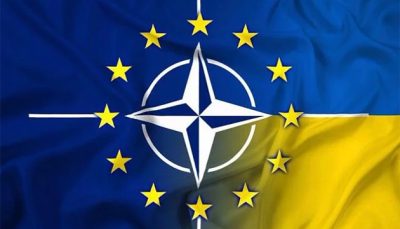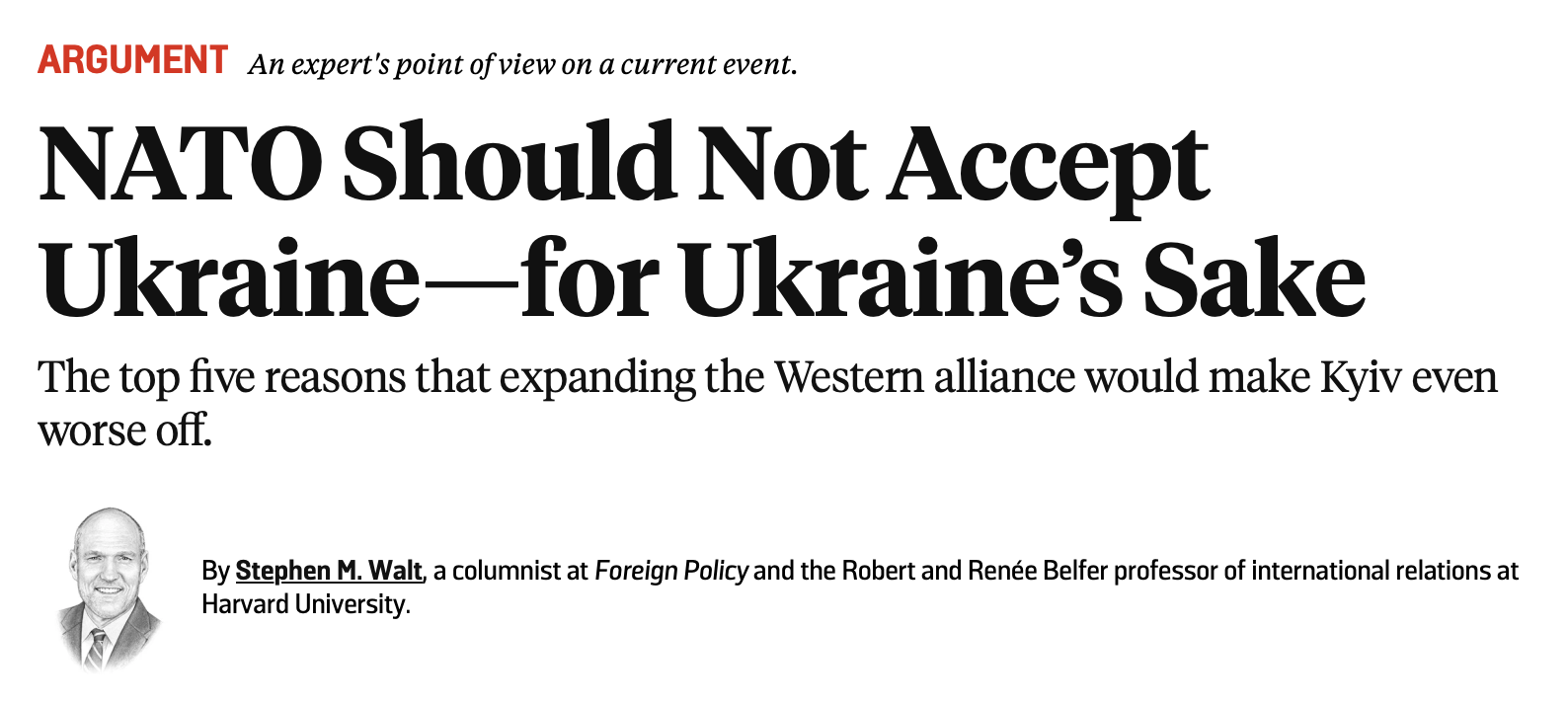Stoltenberg Delusion, Macron’s Military Losses, West Weakens on Non-NATO Ukraine

All Global Research articles can be read in 51 languages by activating the Translate Website button below the author’s name (only available in desktop version).
To receive Global Research’s Daily Newsletter (selected articles), click here.
Click the share button above to email/forward this article to your friends and colleagues. Follow us on Instagram and Twitter and subscribe to our Telegram Channel. Feel free to repost and share widely Global Research articles.
Global Research Fundraising: Stop the Pentagon’s Ides of March
***
While the US publication Foreign Policy accepts Putin’s case on non NATO Ukraine and concedes that Russia cares more for Ukraine than the West there is great dissension within the western alliance. Jens Stoltenberg speaking at Sweden’s NATO membership ceremony continues the war rhetoric:
Surrender is not a peaceful solution. We need to keep making Ukraine strong. We need to show Putin that he won’t get what he wants on the battlefield.
But a French military report leaked to the French media claims the opposite:
“the most serious error of analysis and judgment would be to continue to seek exclusively military solutions to stop hostilities.” A French officer summarises: “It is clear, in view of the forces present, that Ukraine cannot win this war militarily.”
The French report bears close scrutiny because (as Macron’s anger and increasingly aggressive rhetoric shows) the French probably have more troops on the ground in Ukraine than anyone and hundreds have been killed in Russian bombings of military planning targets. The French Report continues:
“Zelensky would need 35,000 men per month, he is not recruiting half of them, while Putin draws from a pool of 30,000 monthly volunteers. The Ukrainian failure at Avdiïvka shows that, despite the emergency dispatch of an “elite” brigade – the 3rd Azov air assault brigade – Kiev is not capable of locally re-establishing a sector of the collapsing front”
The Ukraine warmongers have also suffered a serious blow from the Pope who in a Swiss Television interview called on Kiev to negotiate a peace:
I believe that the stronger one is the one who sees the situation, the one who thinks about people, and the one who has the courage to raise the white flag and negotiate. Today it is possible to negotiate with the help of international powers. The word “negotiation” is a bold one. When you see that you are failing, that things are going wrong, you need to have the courage to negotiate. Shame on you, but how many deaths will this end in? Conduct negotiations in a timely manner, and look for some country that will act as a mediator.
Here Dmitry Babich contrasts western experts’ rational assessment of losses and military weakness with the aggressive and hysterical rhetoric of so many western “Statesmen”.
***
US Foreign Policy Journal Argues Against NATO Membership for Ukraine[1]
By Dmitry Babich
The recent statements of Western leaders on the Ukraine war give the impression of schizophrenia. What is strange about the current situation is the fact that the irresponsible statements are made by political leaders in power, while at least some voices in the media and the opposition are trying to call the “decision makers” back to reason.
It used to be the other way round: “wild dreams” and extreme rhetoric were the realm of the media, while political figures were expected to act responsibly.
Even in the political class Macron’s outlandish statement that sending NATO troops to help Zelensky’s regime “was not excluded” was soon defused by the French Defence Minister Sebastian Lecornu who said such a decision was “not on the table at the moment”.
The Polish foreign minister Radoslaw Sikorski called for “asymetric escalation” in Ukraine – from NATO’s side. In Sikorski’s opinion, the presence of NATO troops in Ukraine “should not be something unthinkable.” No surprise in this statement of this former British citizen (Sikorski fled Poland in the difficult times of the martial law in the 1980s) and the husband of the “neocon media Valkiria” Ann Applebaum.
The rare voices of reason are heard from the expert side – from a small part of the professional media.
Foreign Policy, one of America’s most authoritative magazines on international affairs, even published an article denying the need for Kiev to join NATO. The article is headlined “NATO Should Not Accept Ukraine – for Ukraine’s Sake.” The article’s two authors promise to provide “the top five reasons why expanding the Western alliance would make Kiev even worse off.”
Screenshot from The Foreign Policy Journal
The article’s authors, Stephen Walt and Robert Renée Belfer, realise that they are going against the Western mainstream, because their suggestion not to take Ukraine into NATO is actually Russia’s long standing red line – repeated many times prior to February 2022 by President Putin.
So, what made Foreign Policy’s authors vie away from the Western mainstream on the NATO-Ukraine narrative? One of the factors was Kiev’s ongoing military failure. Here is a quote from The Foreign Policy article:
”Turning to Ukraine, our belief that bringing it into NATO now (or in the near future) is unwise rests on several assumptions. One is that Ukraine cannot reverse the situation on the battlefield and reconquer its lost territory unless it gets a lot more weaponry and has time to reconstitute its forces after the setbacks of the past year. It is suffering from a severe (and probably irreversible) shortage of manpower and the combination of drone surveillance, artillery, and extensive Russian fortifications will make it difficult-to-impossible for Kyiv to make large territorial advances. Ukraine’s cheerleaders in the West were wrong last spring when they offered up optimistic forecasts about the then-upcoming counteroffensive. And they are repeating this error now by suggesting that there are still lots of ways for Ukraine to turn the tide.”
“Kiev cannot reverse the situation on the ground”, FP’s article says, “where the tides of battle have shifted against Ukraine.” FP brings bad news to Zelensky’s regime: with every passing day it has a slimmer chance of “reconquering lost territory.”
But the leading reason for the authors’ shift to realism is not even military, it is psychological. Who cares more about Ukraine – the answer to this question became obvious in the last few months.
“Our assumption is that Russia’s leaders care more about Ukraine’s fate than the West does,” the article says.
The issue is not only post-war reconstruction, which Russia has already started in, say, Mariupol. No NATO country is ready to commit any number of troops to Ukraine that would be even remotely comparable to the Russian army’s contingent now operating at the frontline.
The authors belatedly acknowledge that the West has not acted in Ukraine’s interest from the very beginning:
“NATO’s oft-repeated commitment to bring Ukraine into the alliance undoubtedly fuelled Moscow’s concerns.” “The evidence that the prospect of NATO joining NATO fuelled Putin’s actions is impossible to deny” – in this way the Foreign Policy article belatedly admits a simple truth that had been denied in both Washington and Brussels for years.
So, NATO membership for Ukraine “will only prolong the war”, Foreign Policy concludes, and one could not agree more. “Neutrality may not be that bad for Ukraine” – that is also true. The question is: why is the wise opinion confined to the fringes of the expert community, while Macron’s and Sikorski’s outlandish aggressive suggestions are the mainstream?
*
Note to readers: Please click the share button above. Follow us on Instagram and Twitter and subscribe to our Telegram Channel. Feel free to repost and share widely Global Research articles.
Note
[1] Support for this comes from many in Congress including Utah Senator Mike Lee who serves as the Ranking Republican on the Judiciary Subcommittee on Antitrust, Competition Policy, and Consumer Rights,
“If Ukraine gets in, we need to leave NATO,” he wrote in The American Conservative
“Despite what the Biden administration and the foreign policy establishment would claim, Russia’s decision to pursue military objectives in Ukraine was due in large part to the prospect of further NATO expansion for both Ukraine and Georgia, a redline that Vladimir Putin drew as far back as 2008. Rather than taking such warnings seriously, the U.S. and European capitals continued to beat the drum of expansion by touting the foolish desires of the “rules-based international order” above realism.”


